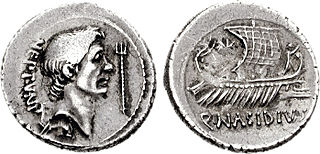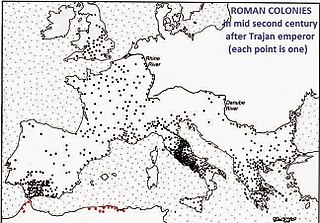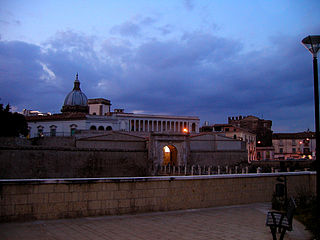
The gens Aurelia was a plebeian family at Rome, which flourished from the third century BC to the latest period of the Empire. The first of the Aurelian gens to obtained the consulship was Gaius Aurelius Cotta in 252 BC. From then to the end of the Republic, the Aurelii supplied many distinguished statesmen, before entering a period of relative obscurity under the early emperors. In the latter part of the first century, a family of the Aurelii rose to prominence, obtaining patrician status, and eventually the throne itself. A series of emperors belonged to this family, through birth or adoption, including Marcus Aurelius and the members of the Severan dynasty.
Opiter is a Latin praenomen, or personal name, which was used primarily during the early centuries of the Roman Republic. It is not usually abbreviated, but is sometimes found with the abbreviation Opet., apparently based on an archaic spelling of the name. No examples of a feminine form used as a praenomen are known, but from a cognomen it appears to be Opita. The name gave rise to the patronymic gens Opiternia, and perhaps also gens Opetreia.

The gens Considia was a plebeian family at Rome. The Considii came to prominence in the last century of the Republic, and under the early Empire, but none of them rose any higher than the praetorship.
The gens Hirtuleia was a minor plebeian family of equestrian rank at ancient Rome, which appears in history during the final century of the Republic, and under the early Empire.
The gens Luciena was a minor family at Rome. Members of this gens are first mentioned in the final century of the Republic.

The gens Naevia, occasionally written Navia, was a plebeian or patrician family at Rome. Members of this gens are first mentioned at the time of the Second Punic War, but the first of the Naevii to obtain the consulship was Lucius Naevius Surdinus, in AD 30.

The gens Nasidia was an obscure plebeian family at Rome. The gens is best known from Quintus Nasidius, one of the admirals of Gnaeus Pompeius Magnus during the Civil War. Although none of the Nasidii are known to have held any of the higher offices of the Roman state, a number are known from inscriptions. A coin of this gens depicts the head of Pompeius and a trident on the obverse, and on the reverse a ship, with the inscription Q. Nasidius.

The gens Neria was a minor plebeian family at Rome. Members of this gens are first mentioned in the time of Caesar, when Gnaeus Nerius was quaestor, but few if any others are known to have held Roman magistracies. Many Nerii are known from inscriptions. A coin issued by the quaestor Nerius depicts the head of Saturn on the obverse, and standards labeled with the names of the consuls on the reverse, perhaps alluding to Caesar having broken open the treasury, or showing the legitimacy of the Senate to the legions against the rebellion of Caesar.
The gens Ollia was a minor plebeian family at Rome. Few members of this gens achieved any prominence, and the best-known may have been Titus Ollius, the father of the empress Poppaea Sabina. Other Ollii are known from inscriptions.
The gens Opsidia or Obsidia was a minor plebeian family at Rome. Few members of this gens are known to have held any magistracies, but several are found in inscriptions.
The gens Orchia or Orcia was a minor plebeian family at Rome. Few members of this gens held Roman magistracies, of whom the most notable was probably Gaius Orchius, tribune of the plebs in 181 BC, and the author of a sumptuary law, the repeal of which was strongly opposed by Cato the Elder. Other Orchii are known from inscriptions.
The gens Orfia was a minor plebeian family at Rome. Few members of this gens are mentioned by ancient writers, but others are known from inscriptions. The best-known may be Marcus Orfius, a military tribune who served under the command of Caesar.
The gens Pactumeia was a minor plebeian family at ancient Rome. Members of this gens are not mentioned by the historians until imperial times, when one branch of the family achieved high rank, holding several consulships during the first and second centuries.
The gens Plaguleia was an obscure plebeian family at ancient Rome. Only one member of this gens is mentioned by ancient writers, although a few others are known from inscriptions.
The gens Pomptina was a minor plebeian family at ancient Rome. The gens is best known from Gaius Pomptinus, praetor in 63 BC, who helped suppress the conspiracy of Catiline, and later defeated the Allobroges. Few of the Pomptini appear in history, but others are known from inscriptions.
The gens Quirinia was an obscure plebeian family at ancient Rome. No members of this gens appear in history, but several are known from inscriptions.
The gens Praeconia, occasionally written Preconia, was an obscure plebeian family at ancient Rome. No members of this gens are mentioned in history, but a few are known from inscriptions.
The gens Rania was an obscure plebeian family at ancient Rome. Few members of this gens occur in history, but others are known from inscriptions. Lucius Ranius Optatus was consul in the early third century AD.
The gens Scantia was a minor plebeian family at ancient Rome. Few members of this gens occur in history, and none of them attained any of the higher offices of the Roman state, but a number are known from inscriptions.

The gens Sentia was a plebeian family at ancient Rome. Members of this gens are first mentioned in history toward the end of the Republic. The first of the Sentii to obtain the consulship was Gaius Sentius Saturninus, in 19 BC.













